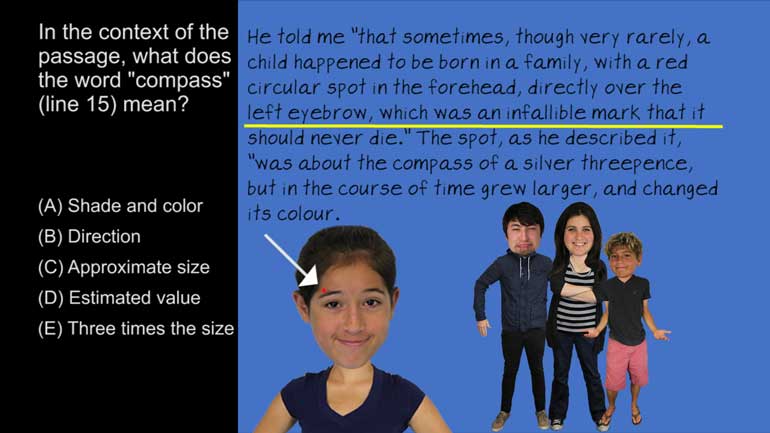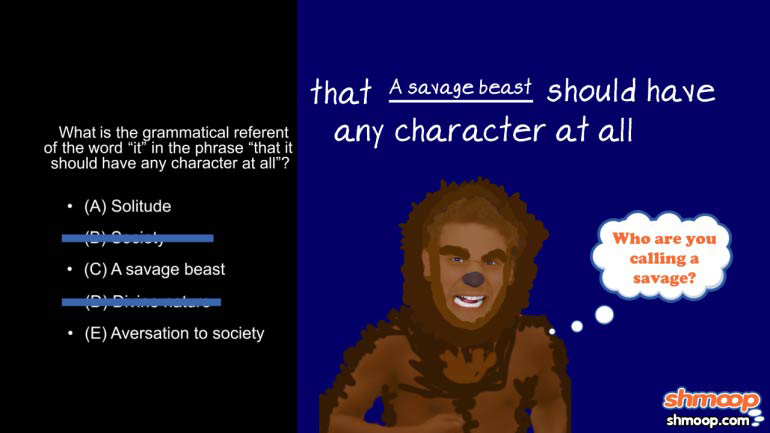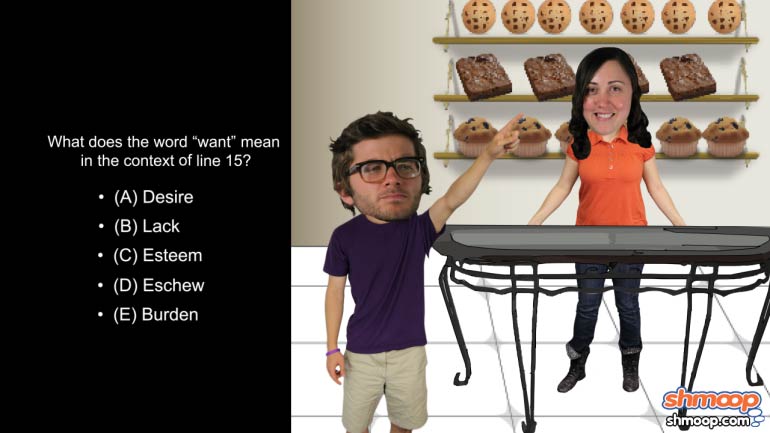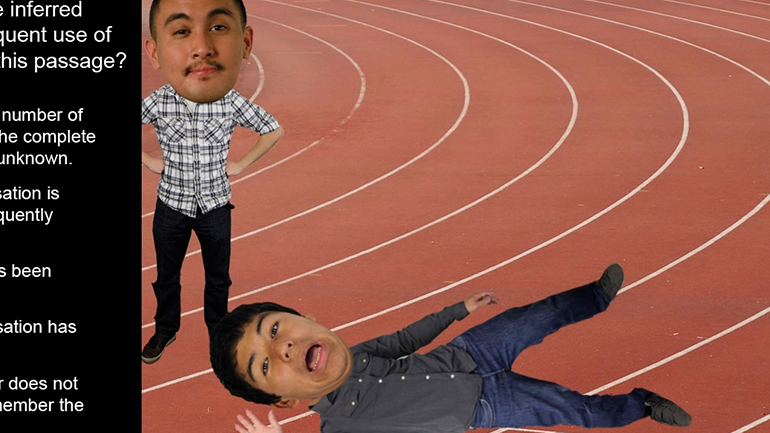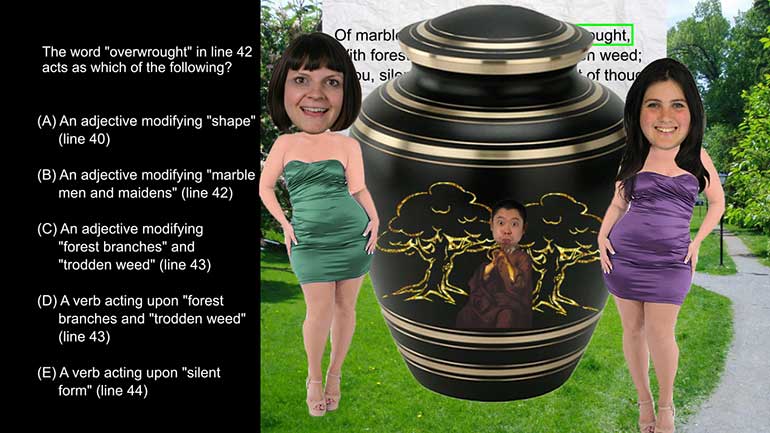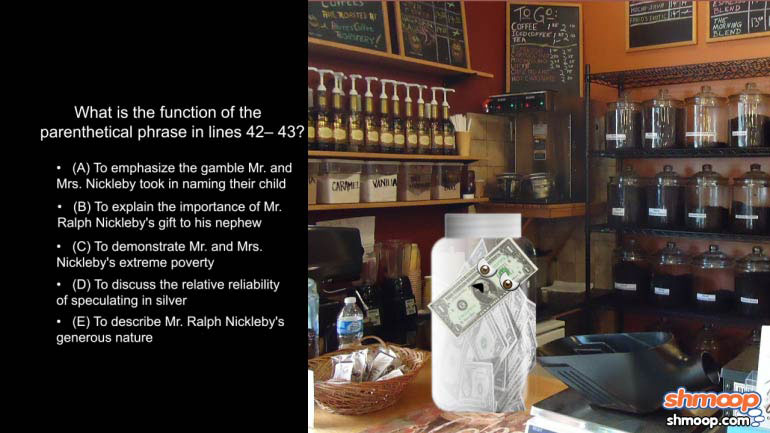ShmoopTube
Where Monty Python meets your 10th grade teacher.
Search Thousands of Shmoop Videos
Diction and Syntax Videos 11 videos
AP English Literature and Composition 1.3 Passage Drill 1. In the context of the passage, what does the word "compass" in line 15 mean?
AP English Literature and Composition 1.6 Passage Drill 1. To what idea does the phrase "my opinion" in line 49 refer?
AP English Literature and Composition 1.10 Passage Drill 1. The speaker's diction in this passage serves to characterize him as which of the f...
AP English Literature and Composition 1.6 Passage Drill 5 245 Views
Share It!
Description:
AP English Literature and Composition 1.6 Passage Drill 5. Death is primarily characterized as what?
- AP English Literature and Composition / Passage Drill 5
- AP English Literature and Composition / Passage Drill
- AP English Literature and Composition / Diction and Syntax
- Test Prep / AP English Literature and Composition
- AP English Language and Composition / Passage Drill
- AP / AP English Literature and Composition
- English / Diction and Syntax
- Product Type / AP English Literature
- Reading Literature / Cite textual evidence to support analysis
- Reading Literature / Cite textual evidence to support analysis
- Reading Literature / Cite textual evidence to support analysis
- Literary Comprehension / Making inferences or predictions about plot, setting, or characterization
Transcript
- 00:03
Here's your shmoop du jour, brought to you by Bones. Because without them, skeletons
- 00:07
just wouldn't be nearly as terrifying.
- 00:18
Death is primarily characterized as... what?
- 00:21
And here are the potential answers...
- 00:28
Okay, time to call out Death on all his shenanigans.
Full Transcript
- 00:31
What got this hooded baddie's goat? What put him in such a bad mood that he has to take
- 00:35
it out on all us poor, breathing people?
- 00:38
We've got five possible answers... let's run through 'em and see what makes sense...
- 00:42
In the poem... is Death mysterious and elusive?
- 00:46
Mysterious? No.
- 00:47
If Death was mysterious, we wouldn't know so much about him... and the author comes
- 00:50
across as quite knowledgeable about his dastardly deeds.
- 00:53
...which will also rule out E -- mysterious and unexplainable.
- 00:56
So we're down to B, C or E...
- 00:57
Is Death powerless and fearful?
- 00:59
The "fearful" part rules this one out. Death inspires fear, but he doesn't seem to be type
- 01:03
to lock all his doors and keep a baseball bat at the side of his bed.
- 01:07
What exactly would Death even be afraid of? Rejection?
- 01:10
"A powerful master of fate and chance" sounds good...
- 01:13
...but line 9 starts, "Thou art slave to fate."
- 01:17
And if you're a slave to something... you can't exactly be its master as well.
- 01:20
Or else our nation's history of slavery would have been much more confusing.
- 01:24
But D -- "a powerless slave to circumstance" is right on the money.
- 01:28
Just because Death gets to be executioner doesn't mean he also gets to be judge and jury.
- 01:32
So D is our answer.
- 01:33
As in, "Dead tired."
Related Videos
AP English Literature and Composition 1.2 Passage Drill 4. As which of the following is the object being personified?
AP English Literature and Composition 1.4 Passage Drill 3. How is Burne's view of pacifism best characterized in lines 57 through 67?
AP English Literature and Composition 1.7 Passage Drill 5. Which line indicates the turn or shift in this poem?
AP English Literature and Composition 1.9 Passage Drill 4. Lines 32-34 are best understood to mean what?
AP English Language and Composition 9.1 Passage Drill. Based on the passage, what best describes the central theme of the essay?
